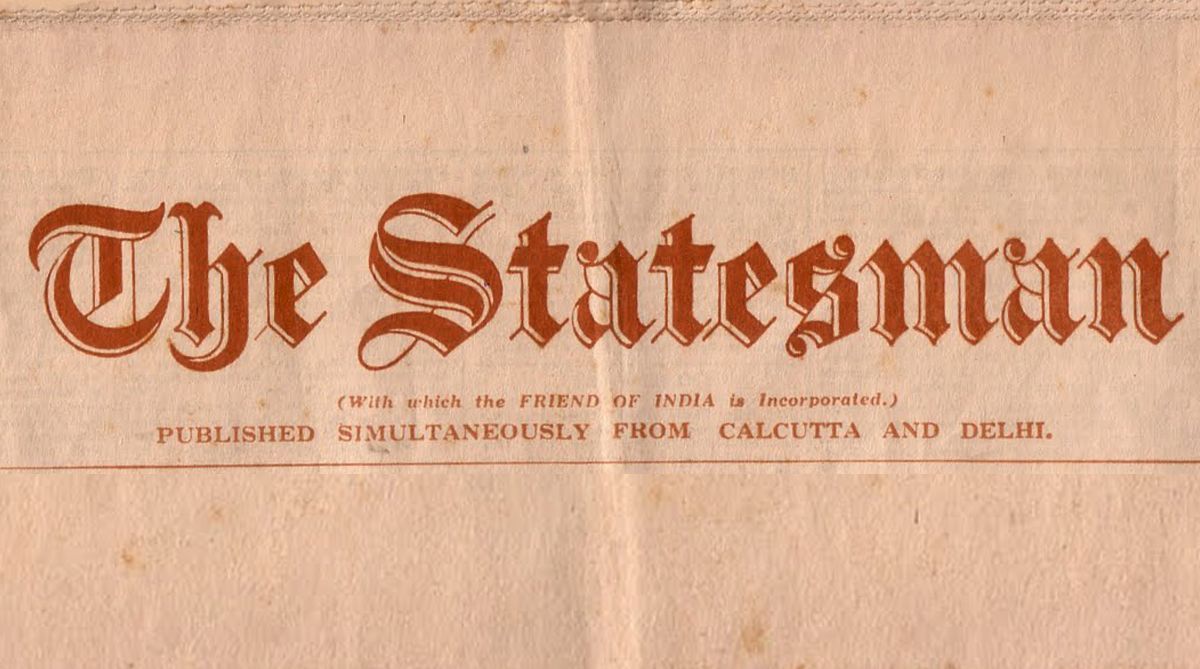A New Day, A New Dawn
There is a surprise for the readers. A special Poila Boishakh gift from none other than West Bengal chief minister Mamata Banerjee. Who has written a piece for this special edition.
On this day a century ago, these were some of the news items The Statesman readers got to read about India and the world.

OCCASIONAL NOTE
The Madras Chamber of Commerce is one of the first European bodies in India to express itself on the proposal to proceed with the Excess Profits Tax, but it may be presumed that it will not be the last. In the course of a trenchant letter to the Government of India, it points out that the trade boom has been followed by the inevitable “slump,” with heavy losses for many concerns which have done well in the past. “The losses in question,” it comments, “will in most cases come into the accounts for next year at a time when money must be found to meet the Excess Profits Tax payable next year on the profits of the preceding years,” and it adds “It must be borne in mind that, admitting that the profits of the current year are due to conditions arising out of the war, the losses now to be met are equally due to the same causes. In the opinion of the Chamber it is not equitable now to impose the Excess Profits Tax when many businesses will be hard pressed to find funds to tide over the difficult times ahead. Such firms are justified in looking to the profits in hand as a reserve against prospective losses.” Another shrewd point taken by the Madras Chamber has reference to the reported intention of the Government to enforce the tax for one year only. “In view of the elaborate administrative machinery necessary to administer the Act, and also the difficulties existing, as referred to by Sir William Meyer, the Chamber trusts that the Government of India will reconsider the whole matter.”
GERMAN CRUELTY TO PRISONERS
Advertisement
In the course of a discussion in the House of Commons on the treatment of prisoners of war, Sir George Cave made a striking indictment against the Germans. He said it was proved that the Germans systematically under-fed, overworked, robbed, cruelly mishandled, beat and even tortured our prisoners. The conditions in some camps were unspeakable and continued today. No words could be too strong to characterise the dastardly treatment on men working in salt mines, factories, etc. Prisoners were still employed under fire despite two pledges. Cruelties, ill-treatment and insults were even prevalent in hospitals and both nurses and doctors were guilty of malpractices. As regards reprisals, he suggested that one means was through the Germans’ great regard for the position, dignity and comfort of their officers and wealthier civilians.
INDIAN CHRISTIANS AND THE REFORM SCHEME
The following resolutions were passed at a general meeting of the Indian Christian Association, Burma:- The members of the Indian Christian Association, Burma, having considered the report by the Viceroy and, Secretary of State for India on Indian constitutional reforms are of opinion: that the Viceroy and the Secretary of State are to be thanked for the sympathetic, liberal and able manner in which they have dealt with the problem, and that the proposals embodied in their report constitute a substantial and definite step towards the realisation of responsible government in India. The development of industries is at least as urgently needed as Government reforms. For this purpose State aid is essential, and steps should be taken to give early effect to the recommendations of the report in the matter.
VAGUE & CONTRADICTORY NEWS
The news from Vienna and Budapest continues vague and contradictory. Despatches from Budapest via Amsterdam describe the soldiers as acclaiming the new National Government, whereas a Copenhagen report states that communication between Berlin and Budapest has been cut, and the last advices reported bloody street fighting between Hungarian and Bosnian troops. Apparently the troops in both capitals are clamouring for peace and the new Governments are trying to smooth them. Thus the German-Austrian Council at Vienna has issued a proclamation to the garrison and also to the soldiers at the front promising the immediate conclusion of peace and speedy demobilisation and urging them to refrain from excesses. Representatives of the Council visited the barracks to negotiate with the soldiers regarding the formation of a German-Austrian army.
HEADLONG FLIGHT OF THE ENEMY
Our indefatigable troops continued to pursue the enemy all day between the Sambre and the Meuse. Shattering local resistances, they advanced ten kilometres at certain points and liberated numerous civilians. The enemy, harassed by our advance guards, abandoned everywhere during his headlong retreat prisoners, guns and material, which have not yet been counted. East of the Sambre we have reached the eastern outskirts of Nouvion and Pegnaval forests and have captured further south Vervins, north of which we are advancing beyond the Serre. The Italians crossed the Hurtaut by assault and stormed Rozoy-sur-Serre. North of the Aisne we are twelve kilometres north of Chateau-Porcien. We have captured Rethel and advanced six kilometres north thereof. Cavalry here charged and captured a battery of field-guns and a battery of four-inches with their gunners and teams.
Advertisement